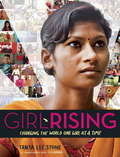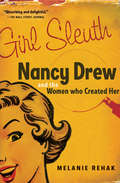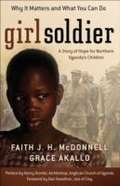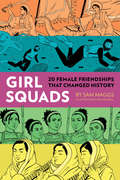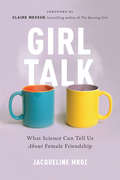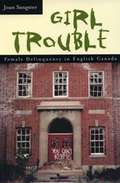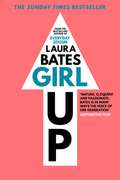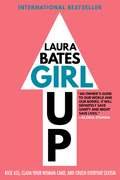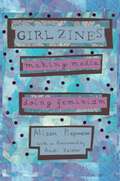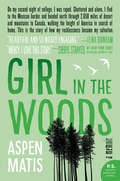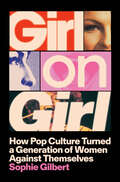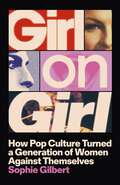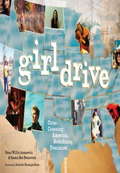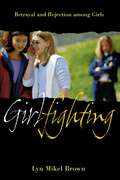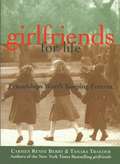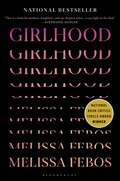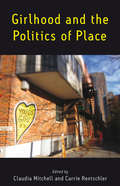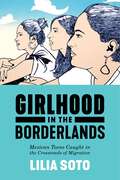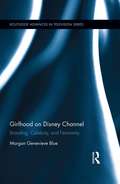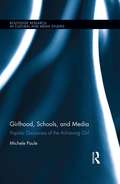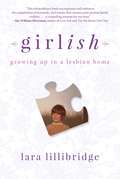- Table View
- List View
Girl Rising: Changing the World One Girl at a Time
by Tanya Lee StoneA gorgeous, full-color oversized book about educating girls across the world inspired by the documentary that Entertainment Weekly says “every mother, sister, daughter, should see, as well as the men who love and support them.” This is the right book for the present moment and perfect for fans of inspirational nonfiction such as I Am Malala and anyone who believes that one girl can change the world. Worldwide, over 62 million girls are not in school. But one girl with courage is a revolution. Girl Rising, a global campaign for girls’ education, created a film that chronicled the stories of nine girls in the developing world, allowing viewers the opportunity to witness how education can break the cycle of poverty. Now, award-winning author Tanya Lee Stone deftly uses new research to illuminate the dramatic facts behind the film, focusing both on the girls captured on camera and many others. She examines barriers to education in depth—early child marriage and childbearing, slavery, sexual trafficking, gender discrimination, and poverty—and shows how removing these barriers means not only a better life for girls, but safer, healthier, and more prosperous communities. With full-color photos from the film, infographics, and a compelling narrative, Girl Rising will inspire readers of all ages to join together in a growing movement to help change the world.“A moving account of hardships and triumphs that is bound to inspire future activists, this is a devastating but crucial read.” —Kirkus Reviews, Starred Additional Praise for the Film: “Delivers . . . tangible hope that the world can be healed in a better future.” —Meryl Streep “Girl Rising stands as a testament to the power of information.” —The Los Angeles Times
Girl Sleuth: Nancy Drew and the Women Who Created Her (Thorndike Nonfiction Ser.)
by Melanie RehakThe true story behind the iconic fictional detective is &“a fascinating chapter in the history of publishing&” (The Seattle Times). An Edgar Award Winner for Best Biography and a Chicago Tribune Best Book of the Year The plucky &“titian-haired&” sleuth solved her first mystery in 1930—and eighty million books later, Nancy Drew has survived the Depression, World War II, and the sixties (when she was taken up with a vengeance by women&’s libbers) to enter the pantheon of American culture. As beloved by girls today as she was by their grandmothers, Nancy Drew has both inspired and reflected the changes in her readers&’ lives. Here, in a narrative with all the page-turning pace of Nancy&’s adventures, Melanie Rehak solves an enduring literary mystery: Who created Nancy Drew? And how did she go from pulp heroine to icon? The brainchild of children&’s book mogul Edward Stratemeyer, Nancy was brought to life by two women: Mildred Wirt Benson, a pioneering journalist from Iowa, and Harriet Stratemeyer Adams, a well-bred wife and mother who took over her father&’s business empire as CEO. In this century-spanning, &“absorbing and delightful&” story, the author traces their roles—and Nancy&’s—in forging the modern American woman (The Wall Street Journal). &“It&’s truly fun to see behind the scenes of the girl sleuth&’s creation.&” —Publishers Weekly &“As much a social history of the times as a book about the popular series . . . Those who followed the many adventures of Nancy Drew and her friends will be fascinated with the behind-the-scenes stories of just who Carolyn Keene really was.&” —School Library Journal &“Sheds light on perhaps the most successful writing franchise of all time and also the cultural and historic changes through which it passed. Grab your flashlights, girls. The mystery of Carolyn Keene is about to begin.&” —Karen Joy Fowler
Girl Soldier: A Story of Hope for Northern Uganda's Children
by Grace Akallo Dan Haseltine Faith McDonnellFor several decades a brutal army of rebels has been raiding villages in northern Uganda, kidnapping children and turning them into soldiers or wives of commanders. More than 30,000 children have been abducted over the last twenty years and forced to commit unspeakable crimes. Grace Akallo was one of these. Her story, which is the story of many Ugandan children, recounts her terrifying experience. This unforgettable book with historical background and insights from Faith McDonnell, one of the clearest voices in the church today calling for freedom and justice will inspire readers around the world to take notice, pray, and work to end this tragedy.
Girl Squads: 20 Female Friendships That Changed History
by Sam Maggs Jenn WoodallA fun and feisty tour of famous girl BFFs from history who stuck together and changed the world.A modern girl is nothing without her squad of besties. But don't let all the hashtags fool you: the #girlsquad goes back a long, long time. In this hilarious and heartfelt book, geek girl Sam Maggs takes you on a tour of some of history's most famous female BFFs, including: • Anne Bonny and Mary Read, the infamous lady pirates who sailed the seven seas and plundered with the best of the men • Jeanne Manon Roland and Sophie Grandchamp, Parisian socialites who landed front-row seats (from prison) to the French Revolution • Sharon and Shirley Firth, the First Nations twin sisters who would go on to become Olympic skiiers and break barriers in the sport • The Edinburgh Seven, the band of pals who fought to become the first women admitted to medical school in the United Kingdom • The Zohra Orchestra, the ensemble from Afghanistan who defied laws, danger, and threats to become the nation's first all-female musical group And many more! Spanning art, science, politics, activism, and even sports, these girl squads show just how essential female friendship has been throughout history and throughout the world. Sam Maggs brings her signature wit and warmth as she pays tribute to the enduring power of the girl squad. Fun, feisty, and delightful to read—with empowering illustrations by artist Jenn Woodall—it's the perfect gift for your BFF.
Girl Talk: What Science Can Tell Us About Female Friendship
by Claire Messud Jacqueline MrozA veteran science reporter's investigation into the fascinating and distinctive nature of women's friendshipsIn Girl Talk, New York Times science reporter Jacqueline Mroz takes on the science of female friendship--a phenomenon that's as culturally powerful as it is individually mysterious. She examines friendship from a range of angles, from the historical to the experiential, with a scientific analysis that reveals new truths about what leads us to connect and build alliances, and then "break up" when a friendship no longer serves us. Mroz takes a new look at how friendship has evolved throughout history, showing how friends tend to share more genetic commonalities than strangers, and that the more friends we have, the more empathy and pleasure chemicals are present in our brains. Scientists have also reported that friendship directly influences health and longevity; women with solid, supportive friendships experience fewer "fight or flight" impulses and stronger heart function, and women without friendships tend to develop medical challenges on par with those associated with smoking and excessive body weight. With intimate reporting and insightful analysis, Mroz reveals new awareness about the impact of women's friendships, and how they shape our culture at large.
Girl Trouble: Female Delinquency in English Canada
by Joan SangsterRarely a week goes by when juvenile delinquency or the Young Offenders Act are not discussed in the dominant media. Are we witnessing a moral panic over youth crime or a spate of “child-blaming” driven by the politics of law and order? Sangster traces the history of young women and crime and in so doing punctures dozens of myths surrounding these issues. Girl Trouble uncovers the voices of girls and their families who are caught up in the juvenile justice system, and provides a critical look at the definitions of, and solutions to, female delinquency. The book fills a significant gap in Canadian social and legal history.
Girl Up
by Laura BatesThey told you you need to be thin and beautiful. They told you to wear longer skirts, avoid going out late at night and move in groups - never accept drinks from a stranger, and wear shoes you can run in more easily than heels. They told you to wear just enough make-up to look presentable but not enough to be a slut; to dress to flatter your apple, pear, hourglass figure, but not to be too tarty. They warned you that if you try to be strong, or take control, you'll be shrill, bossy, a ballbreaker. Of course it's fine for the boys, but you should know your place. They told you 'that's not for girls' - 'take it as a compliment' - 'don't rock the boat' - 'that'll go straight to your hips'. They told you 'beauty is on the inside', but you knew they didn't really mean it. Well I'm here to tell you something different. Hilarious, jaunty and bold, GIRL UP exposes the truth about the pressures surrounding body image, the false representations in media, the complexities of a sex and relationships, the trials of social media and all the other lies they told us.
Girl Up: Kick Ass, Claim Your Woman Card, and Crush Everyday Sexism
by Laura BatesThey told you you need to be thin and beautiful. They told you to wear longer skirts, avoid going out late at night and move in groups - never accept drinks from a stranger, and wear shoes you can run in more easily than heels. They told you to wear just enough make-up to look presentable but not enough to be a slut; to dress to flatter your apple, pear, hourglass figure, but not to be too tarty. They warned you that if you try to be strong, or take control, you'll be shrill, bossy, a ballbreaker. Of course it's fine for the boys, but you should know your place. They told you 'that's not for girls' - 'take it as a compliment' - 'don't rock the boat' - 'that'll go straight to your hips'. They told you 'beauty is on the inside', but you knew they didn't really mean it. Well I'm here to tell you something different. Hilarious, jaunty and bold, GIRL UP exposes the truth about the pressures surrounding body image, the false representations in media, the complexities of a sex and relationships, the trials of social media and all the other lies they told us.
Girl Up: Kick Ass, Claim Your Woman Card, and Crush Everyday Sexism
by Laura BatesAlready an international bestseller, this empowering survival guide provides no-nonsense advice on sex, social media, mental health, and sexism that young women face in their everyday life—from one of the emerging leaders in the feminist movement.They told you that you need to be thin and beautiful. They told you to wear longer skirts, avoid going out late at night, and move in groups—never accept drinks from a stranger, and wear shoes you can run in more easily than heels. They told you to wear just enough make-up to look presentable but not enough to be a slut; to dress to flatter your apple, pear, hourglass figure, but not to reveal too much. They warned you that if you try to be strong, or take control, you’ll be shrill, bossy, a ballbreaker. Of course it’s fine for the boys, but you should know your place. They told you “that’s not for girls”—“take it as a compliment”—“don’t rock the boat”—“that’ll go straight to your hips.” They told you “beauty is on the inside,” but you knew they didn’t really mean it. Well, screw that. Laura Bates is here to tell you something else. Hilarious, bold, and unapologetic, Girl Up exposes the truth about the pressures surrounding body image, the false representations in media, the complexities of sex and relationships, the trials of social media, and all the other lies society has told us. Praise for Girl Up “In Girl Up, Laura Bates has given women of every age a fast, frank, seductively readable guide to surviving in the time of social media, impossible body images, feminist hopes, internalizing fault, standing up for ourselves and each other, and yes, confronting Donald Trump. She leaves no doubt about what consent is, where the clitoris is, what our rights are, and what our hopes could be. This is an owner’s guide to our world and our bodies. It will definitely save sanity, and might save lives.” —Gloria Steinem “Girl Up is an essential compendium of wit, wisdom, advice, and straight-talk. They should give out copies in the delivery room every time another girl enters the world. Or a boy, for that matter—they ought to be reading Girl Up too.” —Sarah Knight, bestselling author of The Life-Changing Magic of Not Giving a F*ck "This is the book young women need—one that teaches them about the anatomy of their vulva instead of how to impress their crush. While many of the topics covered are still relevant to me now, I really wish I'd had this book as a young adult.” —Beth Newell, editor/cofounder of Reductress
Girl Zines: Making Media, Doing Feminism
by Alison PiepmeierThe first book-length exploration of the quirky feminist bookletsWith names like The East Village Inky, Mend My Dress, Dear Stepdad, and I’m So Fucking Beautiful, zines created by girls and women over the past two decades make feminism’s third wave visible. These messy, photocopied do-it-yourself documents cover every imaginable subject matter and are loaded with handwriting, collage art, stickers, and glitter. Though they all reflect the personal style of the creators, they are also sites for constructing narratives, identities, and communities.Girl Zines is the first book-length exploration of this exciting movement. Alison Piepmeier argues that these quirky, personalized booklets are tangible examples of the ways that girls and women ‘do’ feminism today. The idiosyncratic, surprising, and savvy arguments and issues showcased in the forty-six images reproduced in the book provide a complex window into feminism’s future, where zinesters persistently and stubbornly carve out new spaces for what it means to be a revolutionary and a girl. Girl Zines takes zines seriously, asking what they can tell us about the inner lives of girls and women over the last twenty years.
Girl in the Woods
by Aspen MatisIn 2008, Aspen Matis left behind her quaint Massachusetts town for a school two thousand miles away. Eager to escape her childhood as the sheltered baby girl of her family, Aspen wanted to reinvent herself at college. She hoped that far from home she'd meet friends who hadn't known her high school meekness; she would explore thrilling newfound freedom, blossom, and become a confident adult. But on her second night on campus, all those hopes were obliterated when Aspen was raped by a fellow student.The academic year commenced; Aspen felt alone now, devastated. She stumbled through her first college semester. Her otherwise loving and supportive parents discouraged her from speaking of the attack; her university's "conflict mediation" process for handling sexual assaults was callous--then ineffectual. Aspen was confused, ashamed, and uncertain about how to deal with a problem that has--disturbingly--become common at institutions of higher learning throughout the country. Her desperation growing, she made a bold decision: she fled. She dropped out and sought healing in the freedom of the wild, on the 2,650-mile Pacific Crest Trail leading from Mexico to Canada.In this important and inspiring memoir, Aspen chronicles an ambitious five-month trek that was as dangerous as it was transformative. Forced to survive on her own for the first time, squarely facing her trauma and childhood, she came to realize that the rape was not the only shameful burden she carried with her as she walked. She found herself on a new expedition: to confront--and overcome--the confines that had bound her since long before her second night at college.A nineteen-year-old girl alone and adrift, Aspen conquered desolate mountain passes and met rattlesnakes, bears, and fellow desert pilgrims. Among the snowcaps and the forests of America's West, she found the confidence that had eluded her all her life. After a thousand miles of solitude, she met a man who helped her learn to love, trust, and heal. Then from the endless woods she blazed a new path to the future she wanted--and reclaimed it.What emerges is an unflinching portrait of a girl in the aftermath of rape. Told with elegance and suspense, Girl in the Woods is a beautifully rendered story of emotional and physical boundaries eroding to reveal the truths that lie beyond the edges of the map.
Girl on Girl: How Pop Culture Turned a Generation of Women Against Themselves
by Sophie GilbertNamed a most anticipated book of Spring by Washington Post, Harper&’s Bazaar, Marie Claire, Bustle, LitHub, Our Culture, Kirkus, AV Club and WNYCFrom Atlantic critic and Pulitzer Prize finalist Sophie Gilbert, a blazing critique of early aughts pop cultureWhat happened to feminism in the twenty-first century? This question feels increasingly urgent in a moment of cultural and legislative backlash, when widespread uncertainty about the movement&’s power, focus, and currency threatens decades of progress.Sophie Gilbert identifies an inflection point in the late 1990s and early 2000s, when the energy of third-wave and &“riot grrrl&” feminism collapsed into a regressive period of hyper-objectification, sexualization, and infantilization. Mining the darker side of nostalgia, Gilbert trains her keen analytic eye on the most revealing cultural objects of the era, across music, film, television, fashion, tabloid journalism, and more. What she recounts is harrowing, from the leering gaze of the paparazzi to the gleeful cruelty of early reality TV and a burgeoning internet culture vicious toward women in the spotlight and damaging for those who weren&’t. Gilbert tracks many of the period&’s dominant themes back to the rise of internet porn, which gained widespread influence as it began to pervade our collective consciousness.The result is a devastating portrait of a time when a distinctly American blend of excess, materialism, and power worship collided with the culture&’s reactionary, puritanical, and chauvinistic currents. Amid a collective reconsideration of the way women are treated in public, Girl on Girl is a blistering indictment of the matrix of misogyny that undergirded the cultural production of the early twenty-first century, and continues to shape our world today.
Girl on Girl: How Pop Culture Turned a Generation of Women Against Themselves
by Sophie GilbertFrom Atlantic critic and Pulitzer Prize finalist Sophie Gilbert, a blazing critique of how early-aughts pop culture turned women and girls against each other—and themselves—with disastrous consequences. An urgent read that addresses questions around the current regression of feminism.When did feminism lose its way? This question feels increasingly urgent in a moment of reactionary cultural and legislative backlash, when widespread uncertainty about the movement&’s power, focus, and currency threatens decades of progress. Sophie Gilbert, a staff writer at The Atlantic and finalist for the Pulitzer Prize in criticism, provides one answer, identifying an inflection point in the late 1990s and early 2000s when the energy of third-wave and &“riot grrrl&” feminism collapsed into a regressive period of hyper-objectification, sexualization, and infantilization. Gilbert mines the darker side of nostalgia, training her keen analytic eye on the most revealing cultural objects of the era, across music, film, television, fashion, tabloid journalism, and more. What she recounts is harrowing, from the unattainable aesthetic of Victoria&’s Secret ads and explicit music videos to a burgeoning internet culture vicious towards women in the spotlight and damaging for those who weren&’t. Gilbert tracks many of the period&’s dominant themes back to the explosion of internet porn, tracing its widespread influence as it began to pervade our collective consciousness. Gilbert paints a devastating picture of an era when a distinctly American confluence of excess, materialism, and power-worship collided with the culture&’s reactionary, puritanical, and chauvinistic currents. Amidst a collective reconsideration of the way women are treated in public, Girl on Girl is a blistering indictment of the matrix of misogyny that undergirded the cultural production of the early twenty-first century, and how it continues to shape our world today.
Girl on Girl: How Pop Culture Turned a Generation of Women Against Themselves
by Sophie GilbertMOST ANTICIPATED BOOK IN NEW YORK TIMES, HARPER'S BAZAAR, STYLIST, MARIE CLAIRE AND WASHINGTON POST'A captivating must-read for anyone who wants to understand how and why misogyny is as powerful a force as ever' KATE MANNE, author of Down Girl'Add this book to the list of titles that urgently provide context and answers to the hell storm that is [vaguely waves around] everything going on right now' HARPER'S BAZAARCosmetic surgeries are at an all-time high, Ozempic is bringing back 'heroin chic' and TikTok trad-wives are on the rise - after four waves of feminism, what went wrong?Despite decades of progress, the gains of the feminist movement feel more fragile than ever. But as Atlantic critic and Pulitzer Prize finalist Sophie Gilbert points out, this is not a unique moment. Feminism felt just as fragmented in the early 2000s, when the momentum of third-wave feminists and riot grrrls was squashed by lad culture and the commodification of Girl Power. Casting her eye across pop culture of the past thirty years - from Madonna, the Spice Girls and the Kardashians, to MySpace, #GirlBoss and Real Housewives - Sophie Gilbert reveals a toxic pattern of progress and misogynistic backlash. Girl on Girl shows how every form of media, heavily influenced by the rise of porn, has shaped and warped women's relationships with themselves and other women.We cannot move forward without fully reckoning with the ways pop culture has defined us - this book shows us how. 'A book that will make you think, and want to discuss' GLAMOUR'Powerful' NEW YORK TIMES
Girl on Girl: How Pop Culture Turned a Generation of Women Against Themselves
by Sophie GilbertMOST ANTICIPATED BOOK IN NEW YORK TIMES, HARPER'S BAZAAR, STYLIST, MARIE CLAIRE AND WASHINGTON POST'A captivating must-read for anyone who wants to understand how and why misogyny is as powerful a force as ever' KATE MANNE, author of Down Girl'Add this book to the list of titles that urgently provide context and answers to the hell storm that is [vaguely waves around] everything going on right now' HARPER'S BAZAARCosmetic surgeries are at an all-time high, Ozempic is bringing back 'heroin chic' and TikTok trad-wives are on the rise - after four waves of feminism, what went wrong?Despite decades of progress, the gains of the feminist movement feel more fragile than ever. But as Atlantic critic and Pulitzer Prize finalist Sophie Gilbert points out, this is not a unique moment. Feminism felt just as fragmented in the early 2000s, when the momentum of third-wave feminists and riot grrrls was squashed by lad culture and the commodification of Girl Power. Casting her eye across pop culture of the past thirty years - from Madonna, the Spice Girls and the Kardashians, to MySpace, #GirlBoss and Real Housewives - Sophie Gilbert reveals a toxic pattern of progress and misogynistic backlash. Girl on Girl shows how every form of media, heavily influenced by the rise of porn, has shaped and warped women's relationships with themselves and other women.We cannot move forward without fully reckoning with the ways pop culture has defined us - this book shows us how.
Girldrive: Criss-Crossing America, Redefining Feminism
by Nona Willis Aronowitz Emma Bee BernsteinIn October 2007, Nona and Emma embarked on a cross-country road trip, meeting with nearly 200 women from different walks of life to discuss their thoughts and feelings about feminism.
Girldrive: Criss-Crossing America, Redefining Feminism
by Nona Willis Aronowitz Emma Bee BernsteinWhat do young women care about? What are their hopes, worries, and ambitions? Have they heard of feminism, and do they relate to it?These are just a few of the questions journalist Nona Willis Aronowitz and photographer Emma Bee Bernstein set out to answer in Girldrive. In October 2007, Aronowitz and Bernstein took a cross-country road trip to meet with the 127 women profiled in this book, ranging from well-known feminists like Kathleen Hanna, Laura Kipnis, Erica Jong, and Michele Wallace, to women who don't relate to feminism at all. The result of these interviews, Girldrive is a regional chronicle of the struggles, concerns, successes, and insights of young women who are grappling-just as hard as their mothers and grandmothers did-to find, define, and fight for gender equity.
Girlfighting: Betrayal and Rejection among Girls
by Lyn Mikel BrownOffers a developmental explanation for girlfighting and pathways to build girl alliesFor some time, reality TV, talk shows, soap-operas, and sitcoms have turned their spotlights on women and girls who thrive on competition and nastiness. Few fairytales lack the evil stepmother, wicked witch, or jealous sister. Even cartoons feature mean and sassy girls who only become sweet and innocent when adults appear. And recently, popular books and magazines have turned their gaze away from ways of positively influencing girls' independence and self-esteem and towards the topic of girls' meanness to other girls. What does this say about the way our culture views girlhood? How much do these portrayals affect the way girls view themselves?In Girlfighting, psychologist and educator Lyn Mikel Brown scrutinizes the way our culture nurtures and reinforces this sort of meanness in girls. She argues that the old adage “girls will be girls”—gossipy, competitive, cliquish, backstabbing— and the idea that fighting is part of a developmental stage or a rite-of-passage, are not acceptable explanations. Instead, she asserts, girls are discouraged from expressing strong feelings and are pressured to fulfill unrealistic expectations, to be popular, and struggle to find their way in a society that still reinforces gender stereotypes and places greater value on boys. Under such pressure, in their frustration and anger, girls (often unconsciously) find it less risky to take out their fears and anxieties on other girls instead of challenging the ways boys treat them, the way the media represents them, or the way the culture at large supports sexist practices. Girlfighting traces the changes in girls' thoughts, actions and feelings from childhood into young adulthood, providing the developmental understanding and theoretical explanation often lacking in other conversations. Through interviews with over 400 girls of diverse racial, economic, and geographic backgrounds, Brown chronicles the labyrinthine journey girls take from direct and outspoken children who like and trust other girls, to distrusting and competitive young women. She argues that this familiar pathway can and should be interrupted and provides ways to move beyond girlfighting to build girl allies and to support coalitions among girls.By allowing the voices of girls to be heard, Brown demonstrates the complex and often contradictory realities girls face, helping us to better understand and critique the socializing forces in their lives and challenging us to rethink the messages we send them.
Girlfriends for Life
by Carmen Renee Berry Tamara TraederA woman's guide to keeping your girlfriends, based on fan mail and interviews with true blue friends.
Girlhood
by Melissa FebosA gripping set of stories about the forces that shape girls and the adults they become. A wise and brilliant guide to transforming the self and our society. <p><p> In her powerful new book, critically acclaimed author Melissa Febos examines the narratives women are told about what it means to be female and what it takes to free oneself from them. <p><p> When her body began to change at eleven years old, Febos understood immediately that her meaning to other people had changed with it. By her teens, she defined herself based on these perceptions and by the romantic relationships she threw herself into headlong. Over time, Febos increasingly questioned the stories she’d been told about herself and the habits and defenses she’d developed over years of trying to meet others’ expectations. The values she and so many other women had learned in girlhood did not prioritize their personal safety, happiness, or freedom, and she set out to reframe those values and beliefs. <p><p> Blending investigative reporting, memoir, and scholarship, Febos charts how she and others like her have reimagined relationships and made room for the anger, grief, power, and pleasure women have long been taught to deny. Written with Febos’ characteristic precision, lyricism, and insight, Girlhood is a philosophical treatise, an anthem for women, and a searing study of the transitions into and away from girlhood, toward a chosen self.
Girlhood and the Politics of Place
by Claudia Mitchell Carrie RentschlerExamining context-specific conditions in which girls live, learn, work, play, and organize deepens the understanding of place-making practices of girls and young women worldwide. Focusing on place across health, literary and historical studies, art history, communications, media studies, sociology, and education allows for investigations of how girlhood is positioned in relation to interdisciplinary and transnational research methodologies, media environments, geographic locations, history, and social spaces. This book offers a comprehensive reading on how girlhood scholars construct and deploy research frameworks that directly engage girls in the research process.
Girlhood in the Borderlands: Mexican Teens Caught in the Crossroads of Migration (Nation of Nations #1)
by Lilia SotoHow gender and generation shape perceptions of place and time as told through the voices of Mexican teenage girls This book examines the lived experiences of Mexican teenage girls raised in transnational families and the varied ways they make meaning of their lives. Under the Bracero Program and similar recruitment programs, Mexican men have for decades been recruited for temporary work in the U.S., leaving their families for long periods of time to labor in the fields, factories, and service industry before returning home again. While the conditions for these adults who cross the border for work has been extensively documented, very little attention has been paid to the lives of those left behind. Over a six-year period, Lilia Soto interviewed more than sixty teenage girls in Napa, California and Zinapécuaro, Michoacán to reveal the ruptures and continuities felt for the girls surrounded by the movement of families, ideas, and social practices across borders. As they develop their subjective selves, these Mexican teens find commonality in their fathers’ absence and the historical, structural, and economic conditions that led to their movement. Tied to the ways U.S. immigration policies dictate the migrant experiences of fathers and the traditional structure of their families, many girls develop a sense of time-lag, where they struggle to plan for a present or a future. In Girlhood in the Borderlands, Soto highlights the “structure of feeling” that girls from Zinapécuaro and Napa share, offering insight into the affective consequences of growing up at these social and geographic intersections.
Girlhood on Disney Channel: Branding, Celebrity, and Femininity (Routledge Advances in Television Studies)
by Morgan Genevieve BlueSince the early 2000s, Disney Channel has been dominated by original live-action programming popular among tween girls. The shows’ successes rely not only on their popularity among girl audiences, but also on the development of star personae by girl performers, such as Raven-Symoné, Miley Cyrus, and Selena Gomez. In addition, these programs and their performers have spawned lucrative media and merchandising franchises for the Walt Disney Company. This book includes analyses of this Disney Channel programming, as well as Disney corporate reports and executive statements, together with Disney Channel stars’ performances, promotional appearances, media production, philanthropic efforts, and entrepreneurism. Analyzing these texts, performances, activities, and personae, it considers the ways in which they reproduce celebrity, visibility, and feminine performativity as central to successful twenty-first century girlhood.
Girlhood, Schools, and Media: Popular Discourses of the Achieving Girl (Routledge Research in Cultural and Media Studies)
by Michele PauleThis book explores the circulation and reception of popular discourses of achieving girlhood, and the ways in which girls themselves participate in such circulation. It examines the figure of the achieving girl within wider discourses of neoliberal self-management and post-feminist possibility, considering the tensions involved in being both successful and successfully feminine and the strategies and negotiations girls undertake to manage these tensions.The work is grounded in an understanding of media, educational, and peer contexts for the production of the successful girl. It traces narratives across school, television and online in texts produced for and by girls, drawing on interviews with girls in schools, online forum participation (within the purpose-built site www.smartgirls.tv), and girls’ discussions of a range of teen dramas.
Girlish: Growing Up in a Lesbian Home
by Lara LillibridgeAward-Winning Finalist in the LGBTQ Non-Fiction category of the 2018 Best Book Awards sponsored by American Book FestAn honest, unfiltered memoir about a girl with an unconventional family. “The story everyone wants to hear isn’t the story I want to tell.” Lara Lillibridge grew up with two moms—an experience that shaped and scarred her at the same time. Told from the perspective of “Girl,” Lillibridge’s memoir is the no-holds-barred account of childhood in an atypical household. Personally less concerned with her mother’s sexuality and more with how she fits into a world both disturbed and obsessed with it, Girl finds that, in other people’s eyes, “The most interesting thing about me is not about me at all; it is about my parents.” It won’t be long before readers realize that “unconventional” barely scratches the surface. In the early years, Girl’s feminist mother reluctantly allows her to play with her favorite Barbies while her stepmother refuses to comfort her when she wakes up from nightmares. She goes skinny dipping on family vacations in upstate New York and kisses all the boys at church. Girl and her brother travel four thousand miles—unaccompanied—to visit their father in rural Alaska, where they sleep in a locked cabin without running water, telephone, or electricity. Raised to be a free spirit by norm-defying parents, Girl has to define her own boundaries as she tries to fit into heteronormative suburban life, all while navigating her mother’s expectations, her stepmother’s mental illness, and her father’s serial divorces. Lillibridge bravely tells her own story and offers a unique perspective. At times humorous and pithy while cringe-worthy and heartbreaking at others, Girlish is a human story that challenges readers to reevaluate their own lives and motivations.
